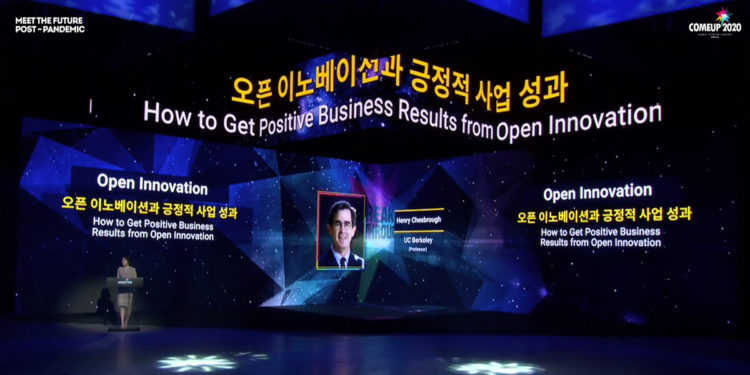The Ministry of SMEs and Startups launched this year’s biggest startup festival in South Korea, the COMEUP 2020, from November 19-21. The three-day event aims to connect startups and business ventures under the theme “Meet the Future – Post Pandemic.”
The second day took on topics such as quantum computing, open innovation, robotics, and artificial intelligence, remote work, and the future of manufacturing.
OPEN INNOVATION: The New Imperative for Creating and Profiting from Technology
Henry Chesbrough, UC Berkeley Professor, discussed Open Innovation as the new requirement for creating solutions and how businesses could benefit from technology. The professor defined open innovation as “a distributed innovation process involving knowledge flow across organizational boundaries, for both pecuniary and non-pecuniary reasons.”
During the discussion, Professor Chesbrough talked about the three key steps to deal with during the COVID-19 pandemic through Open Innovation and subsequently initiate economic recovery.
The three key steps include: stopping the disease, starting the recovery, and managing the disease’s reoccurrence.
Stopping the Disease
Stopping the disease meant ending the growth and spread of the pandemic and which requires speed and agility. Open innovation could generate collaboration between many companies and startups, resulting in new possibilities and innovations. Repurposing ideas could become the trend like in the development of vaccines the candidates already exist as drugs with other particular indications. Manufacturers could share their designs through open innovation processes, which would create more opportunities for startups.
Starting the recovery process from the pandemic entails a lot of effort coming from different sectors and industries. Open innovation would enable an enterprise to explore multiple growth options to improve or develop their business. It could also provide more significant external validation earlier in the process to drive growth.
Recovery Should Move Forward, Not Backward
According to the professor, “recovery should move forward, not backward.” Some initiatives recover longer than others. People should find other areas where attention and financial support would quickly help in the recovery process. AirAsia Company provides a perfect example of starting the recovery process.

When airline stocks collapsed to 60 percent from the middle of March to early May, AirAsia grounded 96 percent of its fleet. The AirAsia revenue fell to 98 percent year-on-year in the second quarter of this year, and the company had to cut its operating expenses by 72% in three months.
AirAsia utilized digital transformations to recover from the pandemic, developing innovations such as delivery on-demand service, virtual banking, personalized flight and accommodation platform, fresh and frozen food delivery, platform for third-party merchants to market their online duty-free shop and startup coaching, incubation, as well as investments to supplement their corporate venture arm.
Managing Crisis Through Innovations
The professor added that companies and countries need a healthy infrastructure to innovate and respond effectively to any new resurgence. Companies should invest in ICT infrastructure to manage a reoccurrence of the disease and promote the business’s continuity.
Professor Chesbrough also explained the exponential paradox in industries. The exponential paradox describes that the pace of technology accelerates as technologies grow in numbers. But the lifespan of such industries like the ones listed in Fortune magazine shortens.
In this regard, organizations must have their own innovation infrastructure to help them face challenges such as pandemics with appropriate solutions. The three facets of innovation include innovation generation, innovation dissemination, and innovation absorption.
Innovation generation consists of creating new ideas to start the innovation process. Innovative ideas come from brilliant people in SMEs and startups. Dissemination of these innovations requires spreading the innovative ideas within the company, outside partners, distribution channels, and customers.
Companies should develop solutions to sell their innovative ideas and let customers and other companies absorb these ideas. Companies should also train their people to make fast decisions to support innovation absorption.
In the end, an open innovation would result in better business models, especially for startups struggling through the pandemic. Businesses would thrive despite the challenges if they welcomed innovation in their systems.
Panel Discussion: Open Innovation: How Big Enterprises Collaborate with the Startup Ecosystem
The first panel discussion on Open Innovation tackled the question of “How big enterprises collaborate with the startup ecosystem?”

Moderated by executive vice president of retail company GS shop Young Hoon, the talk included Sang Hwan (Naver’s D2 Startup Factory leader), Cong-Thang Huynh (Co-Founder & CEO at InnoLab Asia ), and Dong Heon Shinn (Director of LG Corporation’s solution division).
Using Professor Henry Chesbrough’s agenda speech on Open Innovation as the springboard, the panelists discussed and shared their experiences on collaborating and supporting startups. Through their respective companies, they provided new business programs and models to startup ecosystems in various countries.
Panel Discussion: Open Innovation: Can Corporate Venture Capital Keep Up as Startup Needs Change?
Andrew Baisely, Managing Director of Tech in Asia Studios, moderated the second panel talk on the theme of Open Innovation. Panelists include O Kwon, partner at Seoul-based company builder FuturePlay, James Park, Interim Managing Director of Techstars, and Jupe Tan, Managing Partner at Plug & Play’s Asia Pacific operations.

The session discussed how corporate venture capital and corporate innovation programs could keep with the changing needs of startups.
Visit COMEUP 2020 website to view the event’s programs. https://www.kcomeup.com/prog/program-main-event.jsp?







